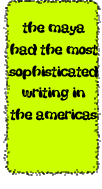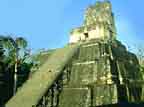
|
 |
|
Classic Maya culture developed in three regions in Mesoamerica. By far the most complete urban developments were in the lowlands in the "central region" of southern Guatemala. This region is a drainage basin about sixty miles long and twenty miles wide and covered by tropical rain forest. The Mayas are only one of two peoples to develop an urban culture in a tropical rainforest. The principal city in this region wasTikal. The most Southern Mayan city was Copan in northern Honduras. In the Guatemalan highlands to the north, Mayan culture developed less fully. The highlands seem to have been the main suppliers of raw materials to the central urban centers. A very large center is Palenque. The other major region of Mayan growth was the Yucatan peninsula making up the northern and eastern portions of modern-day Guatemala. This is a dry region but city centers were built including Chichen Itza and Uxmal (pronounced "Oosh-mal") After the Classic Mayan cities were abandoned, the Yucatán peninsula became the main region of a new, culture called Toltec-Mayan which was formed when Toltecs coming from the north mixed with the native Maya peoples |
 |
| The Mayans built very sophisticated city centers. They understood astronomy and mathematics and had the most developed and complex system of writing in the Americas. | |
|
Almost all the urban centers were built in tropical rain forest. This is the probably the biggest reason why the Mayans never developed a fully urban culture. Topical rain forest is difficult to live in. and can only support small groups of humans. While plant and animal growth seems almost out of control and the rains never stop, tropical rain forest makes very poor farming land. A greater amount of area is required to support each person—and people tend to spread out rather than form cities. |
|
|
There may never more than 30 people per square mile during the classic
period. So the Mayan accomplishments are truly awe-inspiring.
|
|






